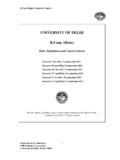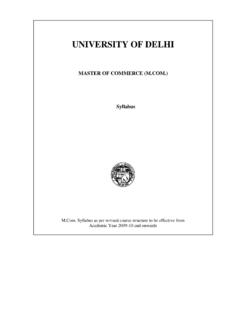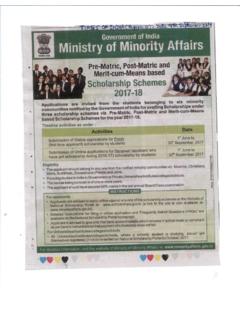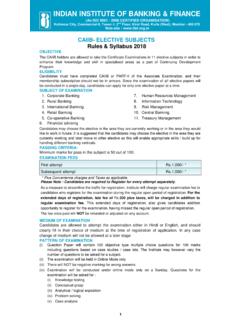Transcription of UNIVERSITY OF DELHI B. Com.
1 Semester Course UNIVERSITY OF DELHI . B. Com. Rules, Regulations and Course Contents Semester I Examination 2011. Semester II April/May Examination 2012. Semester III Examination 2012. Semester IV April/May Examination 2013. Semester V Examination 2013. Semester VI April/May Examination 2014. Syllabus as per revised course structure to be effective from Academic Year 2011-12 and onwards Department of Commerce, 1. DELHI School of Economics, UNIVERSITY of DELHI , DELHI -110007. Semester Course SCHEME OF EXAMINATIONS FOR 1. Examinations shall be conducted at the end of each Semester as per the Academic Calendar notified by the UNIVERSITY of DELHI 2. The system of evaluation shall be as follows: Each course will carry 100 marks, of which 25 marks shall be reserved for internal assessment based on a combination of tutorials, classroom participation, project work, seminar, term papers, tests, and attendance. The remaining 75 marks in each paper shall be awarded on the basis of a written examination at the end of each semester.
2 The duration of written exanimation for each paper shall be three hours. 3. Examinations for courses shall ordinarily be conducted only in the respective odd and even Semesters as per the Scheme of Examinations. Regular as well as ex-students shall be permitted to appear/reappear/improve in courses of odd Semesters only at the end of odd Semester and courses of even Semesters only at the end of even Semesters. 4. PASS PERCENTAGE AND PROMOTION CRITERIA. As per UNIVERSITY rules. 5. REAPPEARANCE IN PASSED PAPERS. As per UNIVERSITY rules. 6. DIVISION CRITERIA. As per UNIVERSITY rules. 7. SPAN PERIOD. As per UNIVERSITY rules. 8. ATTENDANCE REQUIREMENT. As per UNIVERSITY rules. 9. CRITERIA FOR MARKS AND TEACHING HOURS FOR Internal Assessment shall be as per existing norms Marks shall be as follows: o Assignment - 10. Department of Commerce, 2. DELHI School of Economics, UNIVERSITY of DELHI , DELHI -110007. Semester Course o Class Test - 10. o Attendance - 05. There shall be two assignments per semester.
3 There will be no home examination. Instead there shall be a class test held by the teacher(s). who teaches the subject. All other rules of Internal Assessment shall remain the same. Additional Note: 1. In case of paper CP , ( part A and B of Income tax and Auditing respectively): exam has to be attempted on separate answer sheets and has to be evaluated separately. 2. Student has to pass separately in both the Parts. 3. The division for purpose of internal assessment of part A and B are as follows: Income Tax: Auditing Total: 15 marks 10 marks Class test: 6 marks 4 marks Assignment: 6 marks 4 marks Attendance: 3 marks 2 marks Workload and Tutorials. o Lecture per paper/ per week 5. o Preceptorial (fortnightly) per paper/ group 1. o Practical per paper/ week As in structure above o Tutorial Group Size As per existing norms o Practical Group Size As per existing norms o Section Size As per existing norms o Credit 5 +1. Department of Commerce, 3. DELHI School of Economics, UNIVERSITY of DELHI , DELHI -110007.
4 Semester Course Semester Schemes 2011 (Onwards). Semester I. Paper No. Title Maximum Lectures Precept Practi Exam. Marks per orial cals Hours (Fort- Regular IA week nightly). Paper CP Business Organization and 3. Management 75 25 5 1. Paper CP Financial Accounting 3. 75 25 5 1. Paper CP Principles of Micro Economics 3. 75 25 5 1. Paper CP MIL(Hindi/Urdu/Bengali/Sind 3. hi/Tamil/Gujarati/. Telugu/Kannada/Punjabi/Assa 75 25 5 1. mese/Manipuri/Oriya) or Humanities in lieu of MIL. Semester Total 300 100 20 4. Semester II. Paper No. Title Maximum Lectures Precept Practi Examinat Marks per orial cals ion Hours (Fort- week nightly). Regular IA. Paper CP Business and Industrial Laws 75 25 5 1 3. Paper CP Corporate Accounting 75 25 5 1 3. Paper CP Macro Economics 75 25 5 1 3. Paper CP English 75 25 5 1 3. Semester Total 300 100 20 4. Department of Commerce, 4. DELHI School of Economics, UNIVERSITY of DELHI , DELHI -110007. Semester Course Semester III. Paper No. Title Maximum Lectures Precept Practi Exam.
5 Marks per orial cals Hours (Fort- Regular IA week nightly). Business Mathematics &. Paper CP 75 25 5 1 3. Statistics Company and Paper CP 75 25 5 1 3. Compensation Laws Economics Development &. Paper CP 75 25 5 1 3. Policy in India Elective Language (English/Hindi/Punjabi/Sin Paper CP dhi/Assamese/Tamil/Gujar 75 25 5 1 3. ati/Bengali/Manipuri/Telug u/Kannada/Oriya). Semester Total 300 100 20 4. Semester IV. Paper No. Title Maximum Lectures Precept Practi Exam. Marks per orial cals Hours (Fort- Regular IA week nightly). Paper CP Cost Accounting 3. 75 25 5 1. Paper CP part A: Income Tax 50 15 3 3. part B: Auditing 25 10 2 . Paper CP Economic Regulations of 3. Domestic and Foreign 75 25 5 1. Exchange Markets Paper CP Business Communication 3. or Vyapaar Sanchar 75 25 5 1. Paper CP MIL 3. 75 25 5 1. Advanced/Humanities Semester Total 375 125 25 5. Department of Commerce, 5. DELHI School of Economics, UNIVERSITY of DELHI , DELHI -110007. Semester Course Note: 1. In case of paper CP , ( part A and B of Income tax and Auditing respectively): exam has to be attempted on separate answer sheets and has to be evaluated separately.
6 2. Student has to pass separately in both the Parts. Semester V. Paper No. Title Maximum Lectures Precept Practi Exam. Marks per orial cals Hours (Fort- week nightly). Regular IA. Paper CP Financial Management 75 25 5 1 3. Computer Applications in 45 15 5 1 2. Paper CP Business Practical 30 10 2 1. Corporate Governance, Paper CP 75 25 5 1 3. Business Ethics & CSR. Paper CP Industrial Economics 75 25 5 1 3. Semester Total 300 100 20 4. Semester VI. Paper No. Title Maximum Lectures Precept Practi Exam. Marks per orial cals Hours (Fort- week nightly). Regular IA. Paper CP Marketing Management 75 25 5 1 3. Paper CP Business Environment 75 25 5 1 3. Paper CP Human Resource Management 75 25 5 1 3. Paper CP International Trade 75 25 5 1 3. Semester Total 300 100 20 4. Department of Commerce, 6. DELHI School of Economics, UNIVERSITY of DELHI , DELHI -110007. Semester Course Semester I. Paper No. : CP BUSINESS ORGANISATION AND MANAGEMENT. Duration: 3 hrs. Max. Marks: 100. Lectures: 75. Objective: The course aims at providing a basic knowledge to the student about the organization and management of a business enterprise.
7 Unit: I. Business System and Contemporary Business Environment. Forms of Business Organization including LLP. Entrepreneurial Process Idea generation, Feasibility study. Basic considerations in setting up a business enterprise. Emerging trends in business: outsourcing, service sector and e-commerce 20 Lectures Unit II. The Process of Management. Planning Decision Making. Strategy Formulation. Organizing Basic considerations. Departmentation - functional, project, matrix and network. Delegation and decentralization of authority. Dynamics of group behaviour. 15 Lectures Unit-III. Leadership: Concept, Managerial Grid, Situational Leadership. Motivation: Concept and Theories Maslow, Herzberg, McGregor and Ouchi. Control: Concept and Process. 15 Lectures Unit-IV. Conceptual Framework of Marketing Management, Financial Management, and Human Resource Management 10 Lectures Unit V. Change Management: Resistance to change and strategies to manage change, Conflict levels, causes and resolution.
8 Functional and Dysfunctional aspects of conflict. 15 Lectures Department of Commerce, 7. DELHI School of Economics, UNIVERSITY of DELHI , DELHI -110007. Semester Course Suggested Readings: 1. Chhabra ; Business Organisation & Management, Sun India Publications, New DELHI . 2. Shankar, Gauri; Modern Business Organisation, Mahavir Book Depot, New DELHI . 3. Tulsian, ; Business Organisation & Management, Pearson Education, New DELHI . 4. Tripathi, ; Principles of Management, Tata McGraw Hill, Publishing Co., New DELHI . 5. Barry, Jim, Chandler, John, Clark, Heather; Organisation and Management, Thompson Learning, New DELHI . 6. Bushkirk, ; Concepts of Business: An Introduction to Business System, Dryden Press, NY. 7. Douglas, McGregor; The Human Side of Enterprise, McGraw-Hill, New York. 8. Kotler, Philip; Marketing Management: Analysis, Planning, Implementation &. Control, Prentice-Hall of India, New DELHI . 9. Robbins,Stephen P.; Business Today: New World of Business, Harcourt College Publishers, Fortworth.
9 10. Buffa, Elwood S.; Production/Operations Management, Prentice Hall of India, New DELHI . Note: Latest edition of text book may be used. Department of Commerce, 8. DELHI School of Economics, UNIVERSITY of DELHI , DELHI -110007. Semester Course Semester I. Paper No. : CP FINANCIAL ACCOUNTING. Duration: 3 hrs. Max. Marks: 100. Lectures: 75. Objective: To make the student familiar with generally accepted accounting principles of financial accounting and their applications in business organizations excluding corporate entitles. Unit I. (i) Financial Accounting: Nature and scope, Limitations of Financial Accounting. (ii) Basic Concepts and Conventions. Accounting Standards: Meaning, Significance, Generally Accepted Accounting Principles (GAAP). (iii) Accounting Process: From recording of transactions to preparation of final accounts. (iv) Final Accounts of Not-For profit Organization: From receipts and payments account with additional information and vice-versa Preparation of Balance Sheets (opening and closing) from receipts and payments account and income expenditure account and additional information.
10 ` 15 Lectures Unit II. Consignment and Joint Venture Accounts: (i) Consignments: Features, Accounting treatment in the books of the consignor and consignee. (ii) Joint Ventures: Accounting procedures: Joint Bank Account, Records Maintained by Co- venturer of (a) all transactions (b) only his own transactions. (Memorandum joint venture account). 15 Lectures Unit III. Depreciation Accounting: Meaning of depreciation, causes, objects of providing depreciation, factors affecting depreciation, accounting treatment including provision for depreciation accounting. Methods of depreciation: straight line method, diminishing balance method, Change of method as per revised AS-6. Accounting for Hire Purchase Transactions, Journal entries and ledger accounts in the books of Hire vendors and Hire purchaser for large value items including Default and Repossession. 15 Lectures Department of Commerce, 9. DELHI School of Economics, UNIVERSITY of DELHI , DELHI -110007. Semester Course Unit IV. Inland Branches: Dependent branches only and Ascertainment of Profit by Debtors method and Stock and Debtors method.




